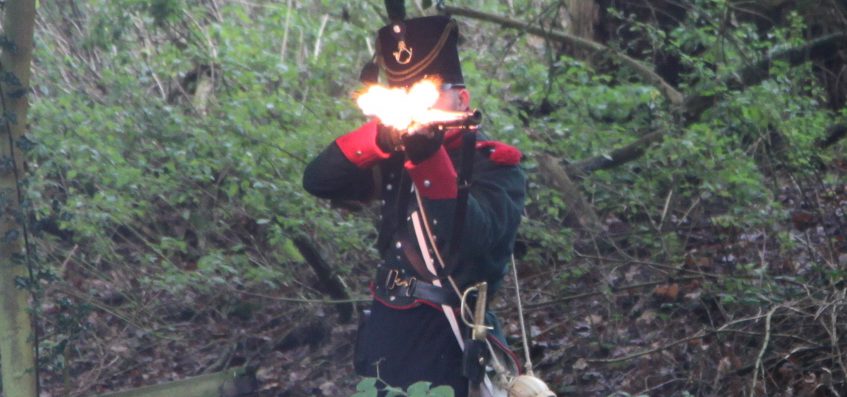This is the second part of my series examining the Peninsular war through the eyes of the British soldiers. In part one we met Sir Arthur Wellesley’s army as it landed at Mondego Bay. In this article the British suffer their first combat casualties during a skirmish with the French at Obidos.
On the 9th August the 6th Brigade under Major General Fane, along with the cavalry, began to reconnoitre south in search of the French. They passed through large pine woods, vineyards and olive groves dotted with whitewashed houses, dazzling in the summer sun.
The following day the entire British force broke up camp and followed them towards Lisbon and inevitable battle. They stayed close to the coast, with the supplies and transports always nearby.
Arriving in the town of Leiria Captain Leach and his colleagues discovered gory evidence of French atrocities agains the local population,
“The town bore the mark of recent depredation, plunder and excess of all kinds. The walls of the convent into which I went with some other officers were covered with blood and brains in many places; damning proof of the scenes that had recently been acted there.[1]”
As the British advanced from their bridgehead, the French began to organise themselves to meet them. A force under Delaborde, Junot’s best General, was dispatched northwards and on the 15th August the two sides briefly clashed for the first time.
Four companies of green jacketed riflemen from the 60th and 95th Regiments, while moving forward to occupy the village of Obidos, suddenly found themselves under fire, suffering the first British combat fatality of the campaign. Rifleman Harris was there,
“The first man that was hit was Lieutenant Banbury; he fell pierced through the head with a musket ball, and died almost immediately. I thought I never heard such a tremendous noise as the firing made on this occasion, and the men on both sides of me, I could occasionally observe, were falling fast. Being overmatched, we retired to a rising ground, or hillock, in our rear and formed there all around its summit, standing three deep, the front rank kneeling. In this position we remained all night, expecting the whole host upon us every moment.[2]”
It was a minor skirmish but the Riflemen, excited by the prospect of an easy victory, had advanced too far and found themselves surrounded. With some difficulty they were eventually rescued when Major-General Spencer arrived at the head of a Brigade. British casualties were twenty-nine men killed, wounded or missing.[3]

[1] Rough sketches of the life of an old soldier. J Leach. P44.
[2] Recollections of Rifleman Harris. 1848. By Benjamin Randell Harris. P.39-40.
[3] A History of the British Army – Vol VI – (1807-1809) by Hon Sir John William Fortescue. Kindle edition, location 3200.

The Skirmish at Obidos is on the north side of the castle. The British were fired upon from the walls and incline, and casualties occurred as soon as they crossed the Arnoia River. A house occupied by the French next to that river provided a crossfire and resulted in the majority of casualties. That same house served as a hospital for soldiers on both sides after the “Skirmish”. That house exists to this day and is next to the train tracks in Obidos. It is believed that then it served as a blacksmith shop. It’s address is 8 Rua da Estação, Obidos. It has belonged to my family for years
LikeLike
That is wonderful – thanks for sharing. Do you still live in the area?
LikeLike
I inherited the home four years ago. I accidentally stumbled upon the “Skirmish” while teaching European History in the U. S. Since then I’ve retired as a teacher. I plan on returning to live in the home and have the town recognize the brave casualties from both sides that died inside and in front of it. I have been able to piece together the events, the hilltop for retreat, and the routes taken to Roliça. I used a painstaking historiographical approach.
What are the chances a History teacher would inherit that place? I immigrated to the States in 1972, have often returned to Portugal. My goal is to make sure Lt. Bunbury, Capt. Chevalier, and others are recognized. Thank you and keep up the great work.
LikeLike